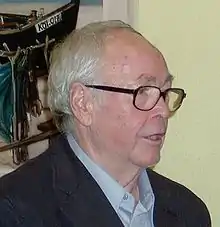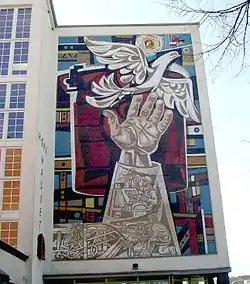Walter Womacka
Walter Womacka (22 December 1925 – 18 September 2010) was a German Socialist Realist artist.


Womacka was born in Horní Jiřetín (Obergeorgenthal), Czechoslovakia. He lived in East Berlin for most of his life, and was the head of the School of Art and Design Berlin-Weissensee from 1968 until 1988. In the post-war rebuilding of Berlin, he designed many large public artworks including stained glass windows using the gemmail technique and large external murals in mosaic. These artworks showing the socialist ideal of "ordinary people" contributing to society are found decorating the buildings of government departments and factories. The Haus des Lehrers ("House of Teachers"- Education Department) on Alexanderplatz in the centre of East Berlin is decorated with a frieze showing the benefits of education. This work has recently been fully restored after many years of neglect. Womacka's designs have also been used on postage stamps.[1][2] Womacka died in Berlin, Germany.
Works (selection)
- Am Strand. 1962, oil, best-selling painting reproduction of the GDR, also as a stamp published
- Wenn Kommunisten träumen. 1976, Palace of the Republic
- Erika Steinführer. Oil on canvas, 1981 for the trade union federation FDGB (today Ludwig gallery lock Oberhausen)
_Unser_Leben%2526Walter_Womacka%252619642.jpg.webp) 1964, Berlin-Mitte, natural stone mosaic at the Haus des Lehrers (house of the teacher)
1964, Berlin-Mitte, natural stone mosaic at the Haus des Lehrers (house of the teacher)
Construction-related work
- 1958, Eisenhüttenstadt, Natural stone mosaic in the town hall
- 1959, Bad Elster, Stained glass window in the drinking hall of the Marienquelle
- 1960/61, Oranienburg, three stained glass windows in the entrance hall to the Museum of the National Memorial and Memorial Sachsenhausen
- 1962, Berlin-Mitte, three stained glass windows in the staircase of the main building of Humboldt University
- 1963/64, Berlin-Mitte, Glass windows in the building of the former State Council of the GDR
- 1964, Berlin-Mitte, Natural stone mosaic at the Haus des Lehrers ("House of Teachers"- Education Department)
- 1966/67, Bern,Ceramic wall in the entrance hall in the Central Office for international railway traffic (OCTI)
- 1968, Berlin-Mitte, Mural enamel on copper Man, the measure of all things; at the former Ministry of Construction of the GDR, Breite Straße, now demolished and attached since autumn 2013 to a renovated prefabricated building on the Friedrichsgracht
- 1968/70, Berlin-Mitte, Fountain of Friendship of Nations on the Alexanderplatz
- 1970, Magdeburg, Wandbild Sonne und Taubenon the Karl-Marx-Straße (dismantled and now privately owned)
- 1971, Berlin-Mitte, Copper relief on the wall of the House of Travel “"Der Mensch überwindet Zeit und Raum"
- 1973 Oberhof, Wall decoration enamel on copper on Hotel Rennsteig (2001 demolished)
Awards
- 1957: Art Prize of the DSF 2. recognition award for the painting Rast bei der Ernte
- 1959: Art Prize of the DDR for the painting Rast bei der Ernte
- 1960: Art Prize of the FDGB for the painting Junge Genossenschaftsbäuerin
- 1962: National Prize of the DDR III. Class
- 1963: Johannes-R.-Becher-Medaille
- 1965: Vaterländischer Verdienstorden in Gold (Patriotic Order of Merit in gold)
- 1966: Erich-Weinert-Medaille
- 1968: National Prize of the DDR II. Class for his artistic work
- 1975: Art Prize of the FDGB
- 1976: Banner der Arbeit in Gold (Banner of work in gold)
- 1982: Hans-Grundig-Medaille
- 1985: National Prize of the DDR I. Class
- 2009: Menschenrechtspreis der Gesellschaft zum Schutz von Bürgerrecht und Menschenwürde (Human Rights Award of the Society for the Protection of Civil Rights and Human Dignity)
See also
References
| Wikimedia Commons has media related to Walter Womacka. |
- David Childs: Walter Womacka: East German painter who remained loyal to communism all his life, The Independent, 25 September 2010
- Socialist Art comes full circle, accessed 17 January 2010
- Haus des Lehrers, accessed 17 January 2010
